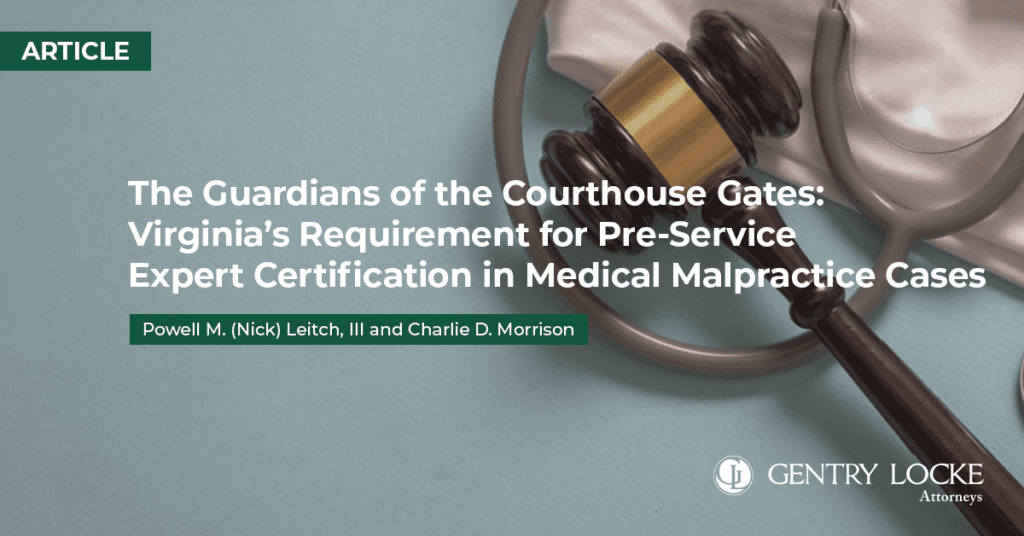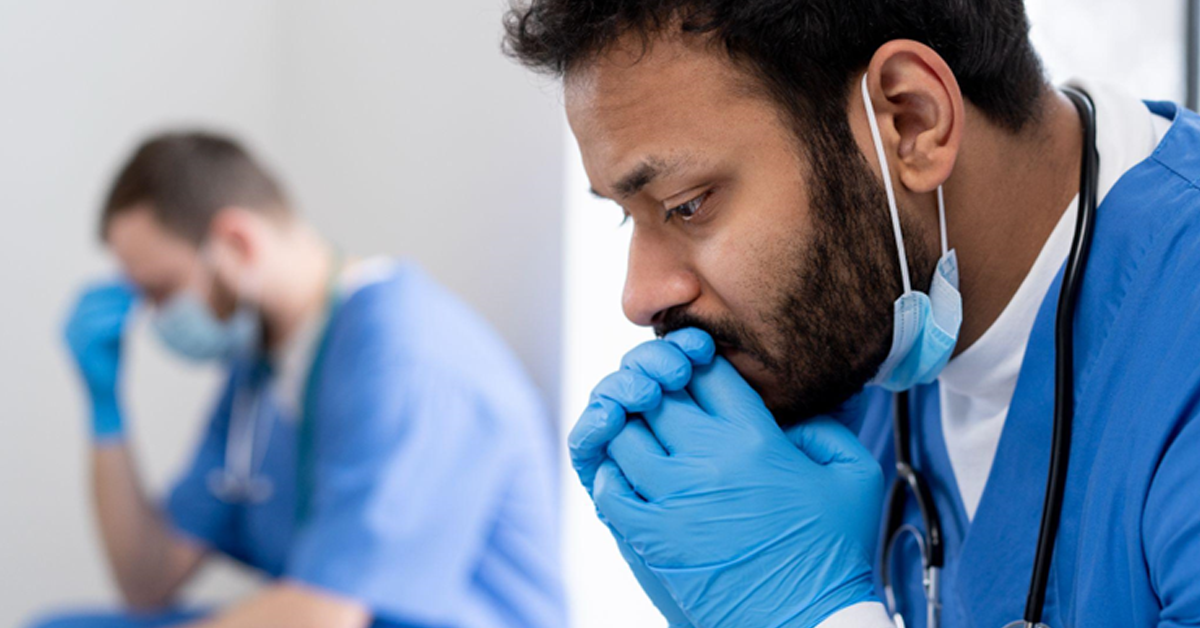The Guardians of the Courthouse Gates: Virginia’s Requirement for Pre-Service Expert Certification in Medical Malpractice Cases

A doctor’s negligence can have devastating and life-altering effects on a patient. A slip of the knife, a missed diagnosis, an unreasonable delay in treatment: All of these can lead to catastrophe. Many times, a patient’s only recourse after an encounter with a negligent healthcare provider is the Civil Justice system and a lawsuit to recover those damages caused by that provider with experienced medical malpractice attorneys.
Although a suit for medical malpractice is just a more specific and specialized claim of negligence, Virginia law places a number of guardians at the gates of the courthouse, in an attempt to weed-out all meritless claims against the Commonwealth’s providers of health care. These guardians take the form of statutory and procedural requirements with which a plaintiff must comply, in order to hold attempt to a health care provider liable for negligent actions. Should a litigant make a mistake, the consequences for their case can be dire. This is why you need a medical malpractice law firm that has knowledge in the subject and experienced lawyers for doctor negligence. One such statutory and procedural requirement is the requirement for a certifying expert.
The Requirement for a Certifying Expert in a Medical Malpractice Case
Section 8.01-20.1 of the Code of Virginia applies to personal injury claims based upon a theory of health care malpractice and provides:
Every motion for judgment, counterclaim, or third party claim in a medical malpractice action, at the time the plaintiff requests service of process upon a defendant, or requests a defendant to accept service of process, shall be deemed a certification that the plaintiff has obtained from an expert witness whom the plaintiff reasonably believes would qualify as an expert witness pursuant to subsection A of § 8.01-581.20 a written opinion signed by the expert witness that, based upon a reasonable understanding of the facts, the defendant for whom service of process has been requested deviated from the applicable standard of care and the deviation was a proximate cause of the injuries claimed.
(emphasis added).
Similarly, Section § 8.01-50.1 of the Code of Virginia applies to wrongful death claims based upon a theory of health care malpractice and provides:
Every motion for judgment, counterclaim, or third party claim in any action pursuant to § 8.01-50 for wrongful death against a health care provider, at the time the plaintiff requests service of process upon a defendant, or requests a defendant to accept service of process, shall be deemed a certification that the plaintiff has obtained from an expert witness whom the plaintiff reasonably believes would qualify as an expert witness pursuant to subsection A of § 8.01-581.20 a written opinion signed by the expert witness that, based upon a reasonable understanding of the facts, the defendant for whom service of process has been requested deviated from the applicable standard of care and the deviation was a proximate cause of the injuries claimed.
(emphasis added).
In other words, if a plaintiff asserts a claim for medical negligence against a health care provider, whether that claim is a claim for personal injury or a claim for wrongful death, that plaintiff must have a qualified expert review the case in advance, and that expert must conclude that the defendant’s health care provider did something wrong which caused the injuries or death at issue. Furthermore, the plaintiff must have obtained a positive review from a qualified expert before serving the lawsuit on the target health care provider. This raises the important question: What is required for a witness to “qualify” as an “expert witness?” The Code of Virginia has a lot to say about this, as well.
The Expert’s Qualifications
Both of these statutes—personal injury and wrongful death malpractice—require the Plaintiff to receive certification from an expert he or she “reasonably believes would qualify as an expert witness pursuant to subsection A of § 8.01-581.20.” Va. Code §§ 8.01-20.1, 50.1.
Va. Code §8.01-581.20(A) states:
A witness shall be qualified to testify as an expert on the standard of care if he demonstrates expert knowledge of the standards of the defendant’s specialty and of what conduct conforms or fails to conform to those standards and if he has had active clinical practice in either the defendant’s specialty or a related field of medicine within one year of the date of the alleged act or omission forming the basis of the action.
(emphasis added).
In sum, two things are required:
- The certifying expert must have knowledge of the standards applicable to the defendant’s health care area of practice. The various areas of practice in the health care industry are nearly infinite: nursing, in all its various forms; surgery, from orthopedic to neuro; family medicine; OB/GYN. The list is nearly endless. The plaintiff must, however, find the right expert for the case.
- The certifying expert must have had an active clinical practice in the defendant’s specialty or a related field within one year of the defendant’s negligent act or omission.
These two prerequisites for qualification require a potential medical malpractice plaintiff to evaluate their potential expert witnesses. Do they know what they claim to know? Have they had the right education and training? Do they practice the right area of medicine? Is their experience recent enough to qualify under the statute? If the answer is “no” to any of these questions, then the plaintiff must keep looking for the right fit.
The consequences of having no expert witness, or even having the wrong kind of expert witness, can be dire. If the plaintiff fails to have a qualified certifying expert before serving the lawsuit on the defendant, or if the expert that they have certified the case is deficient in some way, it could cost the plaintiff the case. The stakes couldn’t be higher.

Consequences for Failing to Get Proper Certification
Both Va. Code § 8.01-20.1 and § 8.01-50.1 carry with them significant penalties for failing to comply with this expert certification requirement:
If the plaintiff did not obtain a necessary certifying expert opinion at the time the plaintiff requested service of process on a defendant as required under this section, the court shall impose sanctions according to the provisions of § 8.01-271.1 and may dismiss the case with prejudice.
(emphasis added).
The plaintiff’s case truly is on the line. If the plaintiff did not obtain the necessary certification prior to service on the defendant, the court is required (“shall”) to impose sanctions. Pursuant to Va. Code § 8.01-271.1, cross-referenced in the statutes, these sanctions run the gamut from simply reimbursing the defendant for the expenses—including legal fees—incurred in responding to the un-certified Complaint all the way to the dismissal of the case, without permission to refile and re-serve the case, after complying with these statutes. This is truly a worst-case scenario: The injured plaintiff who seeks compensation for healthcare-related injuries loses his or her opportunity to take legal action against the negligent healthcare provider.
Talk to An Attorney
If you have been wrongfully injured by a healthcare provider, this is not a process that you should be expected to deal with alone. The stakes are just too high to attempt to navigate this process by yourself. The requirement of expert certification is just one of many traps for the unwary that lie hidden in Virginia’s medical malpractice law. Experienced medical negligence lawyers who specialize in medical malpractice litigation can walk you through the process and guide you past these guardians of the courthouse gates.
Please contact us or call 866.983.0866. Our initial consultation is always free and confidential. We have a team of experienced Virginia medical malpractice attorneys who would be more than happy to assist you.





